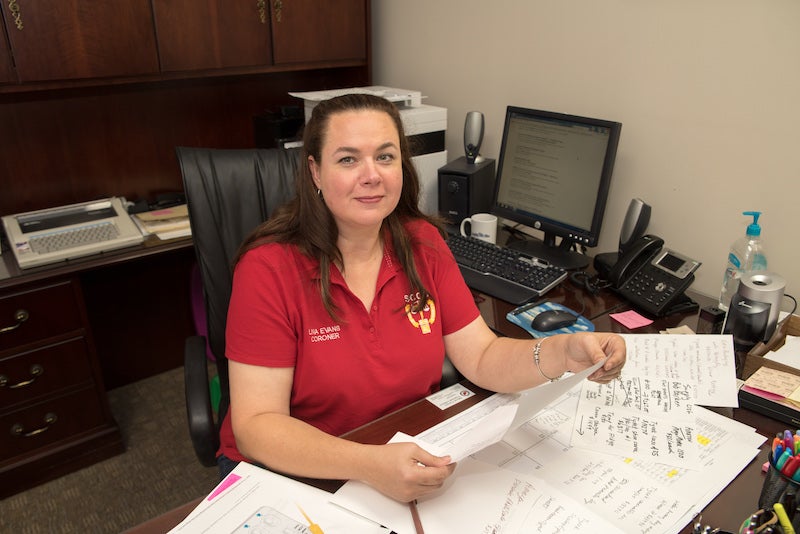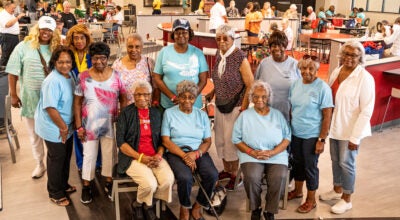PROFILE: Evans committed to making positive difference as county’s newest coroner
Published 2:53 pm Thursday, March 1, 2018

- Lina Evans was appointed by Gov. Kay Ivey as Diana New's replacement as Shelby County coroner last summer. She had served as the county's chief deputy coroner for seven years. (Reporter Photo/Keith McCoy)
By EMILY SPARACINO / Staff Writer
COLUMBIANA – For some people, childhood dreams lead to adult careers. Maybe they follow in a parent’s footsteps or simply choose a career path that aligns with their interests. But for people like Shelby County Coroner Lina Evans, her career choices have had less to do with dreams and more to do with purpose after personal tragedy.
At 6:15 a.m. on Christmas Eve in 1998, Evans received a phone call that her 26-year-old brother Dane had died of a drug overdose. Overcome with denial, she and her parents drove to Dane’s home to make sure it was true.
“He was found laid back on the bed, still with his clothes on from the previous night,” Lina, 45, said. “My dad was relentless in finding out every detail from the previous 24 hours. He found out everything.”
Dane’s lethal overdose was the endpoint of a treacherous trail of drug use he had kept under wraps for a long time. What started as taking prescription pain pills for knee pain turned into a full-blown addiction for Dane, who, like many people struggling with addiction, didn’t appear to be the type of person that would be caught up in the shady underworld of drug deals and substance abuse. He was a land surveyor and owned a karate studio, where he stressed the importance of children developing valuable life skills and a sense of pride in themselves.
“We knew he was taking pain meds for his knee that he really hurt in a karate competition,” Lina said. “He thought just by rest and icing and taking his time, it would heal, but unfortunately it did not.”
Dane refused to have the knee surgery he needed and instead relied on prescription medication to ameliorate the chronic pain.
“It just escalated,” Lina said. “That amount (of medication) he was taking didn’t do the trick. We knew he was taking more. What we didn’t know is it had shifted. He was taking OxyContin. Back then, it was strictly for terminally ill cancer patients.”
He also started taking Xanax, an anxiety medication that shouldn’t be mixed with other drugs. “We found out he was injecting it … he was crushing it … and that’s how he died.”
Lina saw how Dane’s death affected her family, particularly her parents, and Dane’s friends and students. She saw how people reacted to the news, and realized she wanted someday to be in a position in which she could help people during traumatic situations, especially those involving a family member’s death.
“I always wanted to make a difference; that’s why I went into nursing,” Lina said. “I saw how families were communicated with. You get down on their level and make it a little easier to understand.
“Parents need someone to be in contact with. They need details.”
Her path and purpose
Hailing from a family of land surveyors, Lina departed from the norm as she started college, initially setting her sights on forensic pathology. She earned her bachelor’s degree in biology and criminal justice from the University of South Alabama in 2000. In 2008, she earned an associate’s degree in registered nursing from Jefferson State Community College, followed by a Bachelor of Science in nursing from the University of Alabama at Birmingham in 2010. She earned a master’s degree in forensic science from UAB in 2017.
She still works in medical research at UAB.
Dr. Jeffrey Kerby, professor and director of UAB’s Division of Acute Care Surgery in the Department of Surgery, has worked with Lina for 15 years and described her as dedicated and conscientious, someone who always performs at an exceptional level in her multiple roles in the division, and a team player.
“She has many skillsets and will do what is necessary to complete the job,” Kerby said. “Great people person and patient, skillful educator.”
She has written numerous papers and published pieces in scientific journals, worked at Children’s of Alabama part-time as a nurse and served as Shelby County’s chief deputy coroner for seven years. Last spring, following former county coroner Diana New’s resignation, Shelby County Probate Judge Jim Fuhrmeister appointed Lina as county coroner on a temporary basis, pending an official appointment from Alabama Gov. Kay Ivey. In late July, Ivey appointed Lina as New’s permanent replacement.
“I believe that the coroner and all its members serve as the eyes, ears and hands of the forensic pathologists in the field,” Evans wrote in a letter addressed to County Manager Alex Dudchock and the Shelby County Commission. “In my role as chief deputy coroner, I have a great understanding of the role and responsibilities of the coroner’s office as well as strong working relationships with the current staff. I believe that this experience provides the county with greatest stability and continuity during the remainder of Diana’s term.”
In the letter, Lina wrote that she has obtained certification as a death investigator through the American Board of Medicolegal Death Investigators, is a member of the International Coroner and Medical Examiners Association and the International Association of Forensic Nurses, worked in medical research at UAB for more than 17 years and performed assault exams at Safe Shelby Center.
She is in the process of becoming a Board Certified Fellow with ABMDI, and would be the only person in Alabama with that distinction. “I’m very happy for that,” she said.
New said “there is nobody who cares more” about doing her job well than Evans.
“There’s nobody else more qualified than Lina,” she said. “She cares about the county, she cares about teaching her deputies and getting more schooling for everybody, including herself.”
Evans was chief deputy coroner when New was coroner. Like the other deputies, Evans had the compassion necessary for handling sensitive situations on the job. When New made the decision to step down as coroner for health reasons, she knew the office would be in good hands with Evans leading.
“She’s worked very, very hard these last couple of years just to help me along,” New said. “She’s like an angel to me because she’s been so helpful. She cares about the people, the families. She’ll be a lifetime friend to me, more like a sister to me. I’ll be her biggest fan.”
No typical days
Lina and her four deputy coroners, including one chief deputy coroner, have call days with 12-hour rotations. No two days are exactly the same, and Lina knows her schedule can change at a moment’s notice.
“You never know what’s going to happen, and when you think you’ve seen it all, it’s just something completely surprising to you,” Lina said. “There’s never just an average day.”
One of Lina’s main goals as coroner is to remain available to the families she or one of her deputy coroners has had to notify of a loved one’s death for as long as they need them.
“It’s an ongoing process with us,” she said. “A lot of families don’t know what to do when someone dies. For something sudden to happen, you’re kind of lost, and you don’t know what to do. We like to help them with that. We know that’s the worst time.”
Lina and her staff don’t take their duties lightly.
“All our deputy coroners know, when we go and talk to somebody, we know we’re bringing the worst news to them, and we’re going to forever change their life. Have empathy, have sympathy, but still do your job. Give families the correct and vital information.”
The Shelby County Coroner’s Office averages about 540 cases a year, 15 percent of which result in autopsy. Five percent of the cases are related to overdose; 7-8 percent are suicides; 1-2 percent are homicides; and 65 percent are natural deaths at home.
Lina said a common misconception is that every death results in an autopsy, but the state doesn’t have enough money to cover autopsies for every death. In addition, the Alabama Department of Forensic Sciences is down to one lab to handle toxicology results, including those for Shelby County, which can sometimes create a five- to six-month delay with results, she said.
“I know that’s frustrating for families,” Lina said. “I feel so bad for families that have to wait. I wish we had more money to help that situation with Alabama.”
According to the ADFS website, the Toxicology Discipline “provides assistance to local, county, state and federal law enforcement agencies in Alabama in death and criminal investigations. This assistance includes laboratory analyses of biological specimens for the presence of drugs and poisons. The findings of these analyses may then be used to establish cause and manner of death or to establish or explain impairment or performance of an individual pursuant to criminal activity.”
The Shelby County Coroner’s Office is notified of any death in the county 24 hours a day, seven days a week, and is responsible for investigating the cause and manner of death. The office works with local law enforcement officers in criminal death cases.
“We don’t go and badger the witness or get the suspect in,” Lina said of her office. “That is something seen on TV. The police are responsible for investigating who committed the crime. In Shelby County, we have some great police officers and great police chiefs. We’re lucky here in Shelby County.”
Overdose cases hit close to home with Lina because of her brother’s death. She knows the denial that will grip some parents when they are told their seemingly healthy son or daughter with a bright future has overdosed on drugs.
“When I go out to a call with someone who has overdosed, I remember getting the phone call,” she said. “Parents have gotten really angry at me for saying, ‘This is a drug overdose.’ I really hate it. These aren’t bad people; these are honest, everyday people. It’s your family, your friends, your neighbors.”
As coroner, Lina has outreach opportunities to talk to local students and parents about drug overdoses, substance abuse, drunk driving and other issues that appear in the county’s death cases.
As of October 2017, Lina’s office had processed 25 drug overdose deaths, and expected the year-end total to be higher than the previous year.
“The interesting thing we’re seeing is less prescription overdoses, so I believe doctors and prescribers are listening when we say, ‘Slow down the opioids,’” she said. “Unfortunately, now, it’s turned to heroin, cocaine, and every case has Xanax.”
Lina emphasized her office’s willingness to point people toward help for drug addiction, mental illness and other problems when they ask for it.
“We’re here all the time if anybody has any questions at any time,” she said. “We are always here to get you in contact with the person you need to contact. In a lot of our cases, people feel like they’re in despair or alone. Nobody in this world should ever feel alone. You can always ask for help.”
Personal interest in helping
In Shelby County, a coroner is elected every four years, and in 2018, the position will be on voters’ ballots. When asked if she plans to run next year, Lina’s response was a firm “absolutely.”
“I am invested in this,” she said.
Earlier this year, she applied for a grant with the Department of Justice to get the Shelby County Coroner’s Office accredited, meaning it would follow national protocols regarding autopsies, paperwork and training for coroners and deputy coroners.
“Lina is extremely hard-working and dedicated to getting the job done right,” Kerby said. “She will work tirelessly to serve her community and will represent them with utmost professionalism if elected.”
On a daily level, Lina wants her team to be as experienced as possible in properly handling different situations with decedents and their family members. She knows the contact her office has with families will stick with them for a long time after their loved ones’ deaths. Sometimes, families call or send cards to thank the staff for helping them through such a difficult time.
“As the coroner’s office, we send out condolence cards as well,” she said. “We’re there for the decedent, but we’re there for the family too.”
Lina admits the work can be emotionally draining, but she recognizes when she or one of her deputy coroners needs to take a step back and regroup. For her, home is a good place to go for rejuvenation. Lina, her husband, Chris, her stepson and Lina’s mother recently moved to a farm in Montevallo, where they have various animals.
“We’ve been wanting to do that for a long time,” Lina said. “You’ve got to have a happy place.”
Lina and Chris met in 2010 and were married two years ago. Chris’s description of Lina as one of the hardest-working people he knows isn’t surprising considering how many responsibilities she juggles so efficiently day in and day out.
“She’s just a very driven person to get things done,” Chris said. “She works three different jobs, where most people would struggle to take one of them.”
In addition to her work, Lina is involved in her community and church, he added.
“She’s taken on a lot of care with the opioid addiction that’s going on in the country and the county. She has personal interest in that,” Chris said. “Also, she’s extremely bright. I haven’t come in contact with too many people that are always trying to learn and improve.”
Chris said the people of Shelby County are well-served with Lina as coroner.
“I was really proud of her when she moved into the role as coroner,” he said. “I don’t think the county would have anybody that would better serve them than her.”









